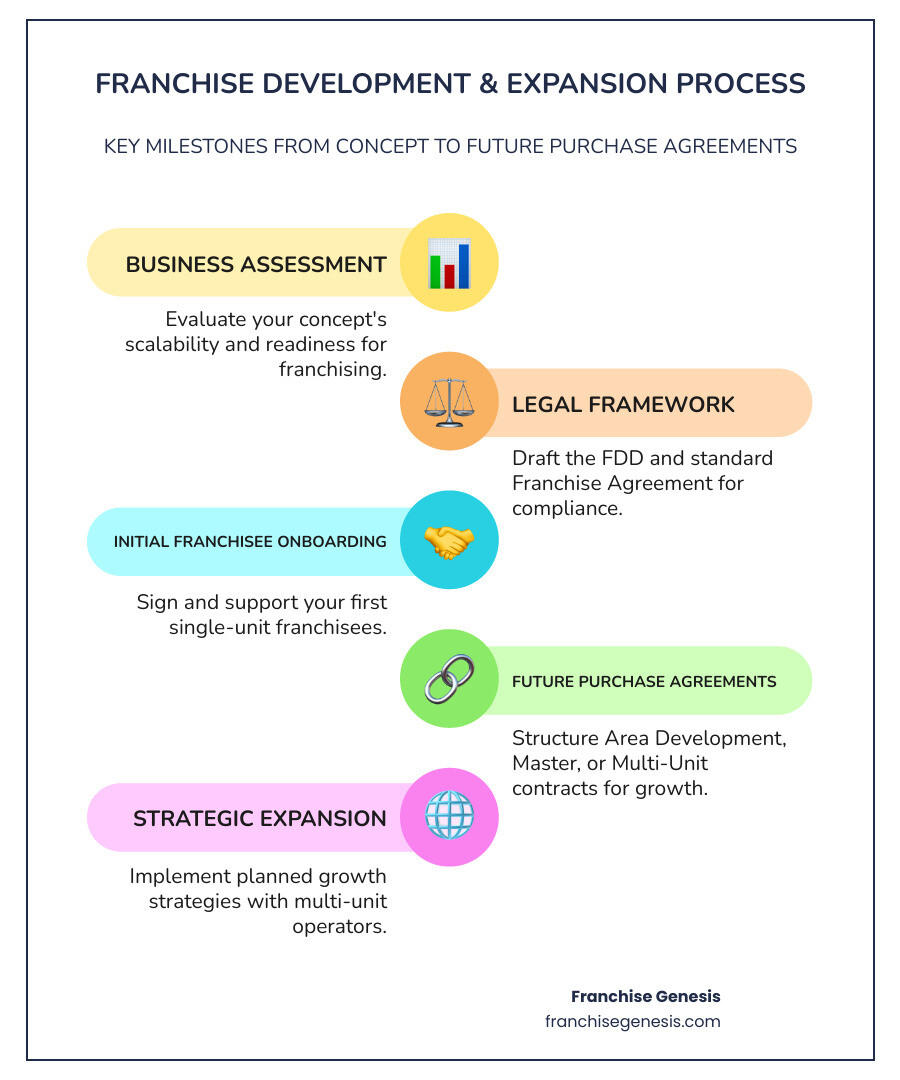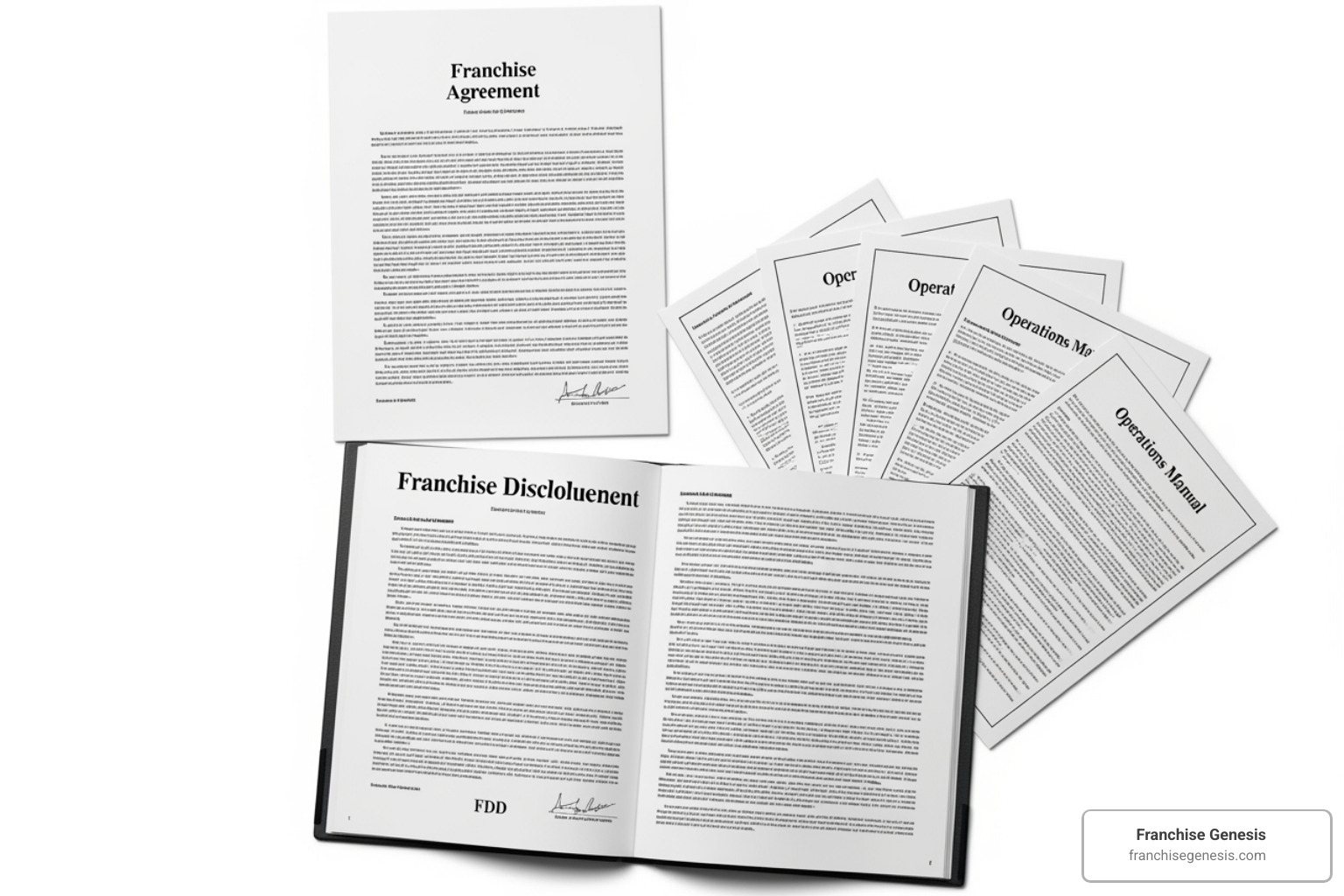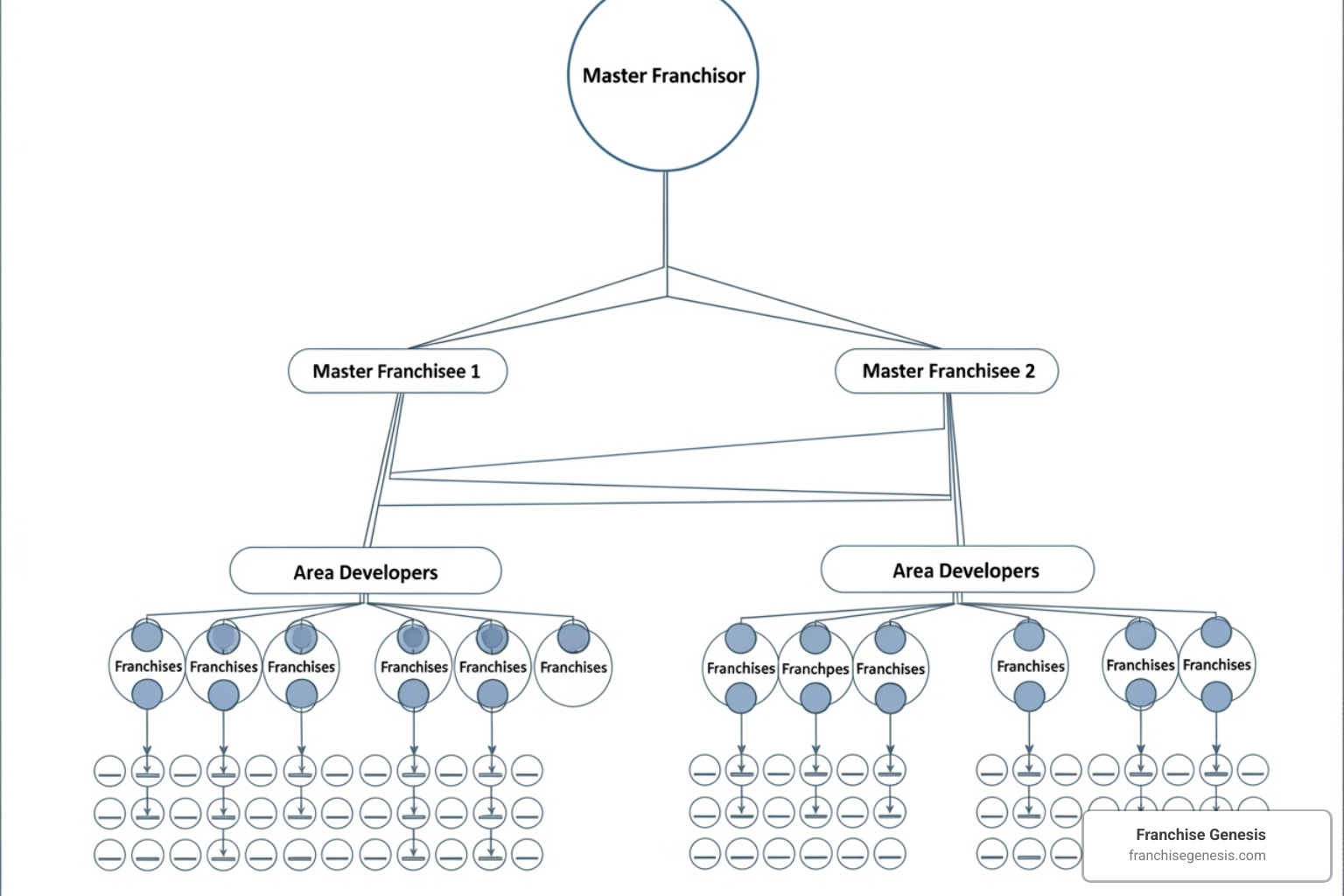Understanding Agreement for Future Purchase of Franchise Documents
An agreement for future purchase of franchise is a legal contract granting a franchisee the option to acquire franchise rights at a later date. It’s a key tool for area development and multi-unit expansion. Here’s what business owners need to know:
Key Types of Future Purchase Agreements:
- Area Development Agreements: Grant options to open multiple units in a territory over time.
- Master Franchise Agreements: Provide rights to sub-franchise in specific regions.
- Multi-Unit Development Contracts: Secure commitments for phased expansion.
Essential Elements:
- Development fees and future franchise fees
- Timelines and development schedules
- Territorial rights and exclusivity
- Performance requirements
As a business owner franchising your concept, you’ll use these agreements for franchisees expanding beyond a single location. Unlike standard franchise agreements for immediate operations, these documents focus on the legal framework for planned growth. Creating effective future purchase agreements requires careful legal structuring to protect your brand and your franchisees’ investment.
I’m Monique Pelle Kunkle, Vice President of Operations at Franchise Genesis. I’ve guided numerous business owners through structuring agreement for future purchase of franchise documents as part of their expansion strategy, helping scale franchises to over 100 locations in their first year.

Agreement for future purchase of franchise vocab to learn:
Decoding the Franchise Agreement: A Franchisor’s Blueprint
When you franchise your business, the Franchise Agreement is the DNA of your franchise system. It’s the legal blueprint that defines how franchisees operate, ensuring brand integrity as you expand. This document works with your Franchise Disclosure Document and Operations Manual to create a complete system for growth.

What is a Franchise Agreement and Why is it Your Most Critical Tool?
A Franchise Agreement is the binding contract granting the right to operate a business using your brand and systems. It’s your most critical tool for several reasons:
- Defines the Relationship: It clarifies franchisor support and franchisee obligations, preventing confusion.
- Enforces Standards: It provides the legal authority to maintain brand consistency and quality across all locations.
- Attracts Quality Franchisees: A professional, comprehensive agreement signals a mature, supportive system to smart entrepreneurs.
- Ensures Legal Enforceability: It outlines dispute resolution and protects both parties, which is vital in an agreement for future purchase of franchise.
- Protects Intellectual Property: It secures your trademarks and trade secrets during and after the franchise relationship.
Understanding Franchise Law is key to covering these areas properly.
The Franchisor’s Obligations vs. The Franchisee’s Rights
A successful franchise system is a partnership. Your Franchise Agreement must establish a win-win structure with clear mutual obligations.
- Franchisor Support: You must provide comprehensive training, ongoing operational assistance, site selection guidance, and marketing support.
- Franchisee Compliance: Franchisees must follow your operational requirements, reporting obligations, and quality standards to maintain brand consistency.
The goal is to balance control and autonomy. You need enough control to protect the brand, while franchisees need the independence to run their businesses profitably. This balanced approach is crucial in an agreement for future purchase of franchise, where long-term commitment is required from both sides.
For more detailed guidance on structuring these relationships, check out More info about franchising your business.
Crafting the Core: Essential Elements of Your Franchise Agreement
A strong franchise agreement is the foundation for growth, protecting your brand while creating opportunity. It rests on four pillars: financial structure, operational framework, relationship lifecycle, and territorial rights.

Financial Commitments: Fees, Royalties, and Costs
Financial transparency builds trust. Your agreement must clearly outline all costs to create predictability and a sustainable revenue model.
- Initial Franchise Fee: A one-time, upfront payment granting the franchisee rights to your system, brand, and initial training.
- Royalty Structure: An ongoing fee, typically 4-8% of gross sales, that funds system-wide support, innovation, and growth.
- Advertising Fund Contributions: A percentage of sales pooled for powerful national and regional marketing campaigns.
- Payment Terms and Reporting: Clear requirements for when payments are due and what financial data must be reported.
An agreement for future purchase of franchise often involves more complex financial planning for multiple locations. For more on fee structures, explore The Cost to Start a Franchise and Financing Options.
Operational Framework: Training, Support, and Intellectual Property
This section ensures a consistent brand experience at every location.
- Training and Support: Detail the initial training requirements and the ongoing operational assistance (field visits, support team access) you will provide.
- Franchise Operations Manual: The agreement must mandate adherence to this confidential guide, which contains all your proprietary procedures and standards.
- Trademark Usage and Brand Standards: Grant the right to use your brand assets while setting strict guidelines to protect your intellectual property.
- Quality Control: Specify product/service standards, signage, and local marketing obligations to maintain a uniform customer experience.
The Agreement Lifecycle: Duration, Renewal, and Termination
Clear expectations for the relationship’s lifecycle protect both parties and encourage long-term success.
- Contract Duration: Typically 10-20 years, giving franchisees enough time to build a profitable business.
- Renewal Rights: Outline the conditions for renewal, such as being in good standing, paying a fee, and upgrading the location.
- Termination and Cure Periods: Define what constitutes a breach and provide a reasonable period for the franchisee to “cure” the issue, demonstrating a commitment to partnership.
- Post-Termination Obligations: Specify requirements after the agreement ends, including de-identification and non-compete covenants.
These provisions are critical in an agreement for future purchase of franchise. For more, visit Franchise Agreement Essentials.
Defining the Territory: Location, Exclusivity, and Site Development
Getting territory rights correct prevents disputes and sets franchisees up for success.
- Designated Area: Precisely define the territory using boundaries like zip codes or a specific radius.
- Exclusive vs. Non-Exclusive Territory: An exclusive territory is highly attractive to franchisees as it prevents intra-brand competition.
- Franchisor’s Reserved Rights: Clearly state rights you retain within a territory, such as online sales or non-traditional venues.
- Site Selection and Lease: Clarify your role in approving sites and any requirements related to the franchisee’s lease.
The Legal Landscape of an Agreement for Future Purchase of Franchise
Understanding franchise law is critical to building a foundation that protects your brand and future franchisees. The legal landscape for an agreement for future purchase of franchise is governed by federal and state regulations designed to ensure transparency.
The cornerstone of this framework is the Franchise Disclosure Document (FDD). Mandated by the Federal Trade Commission’s Franchise Rule, the FDD is a comprehensive document detailing your franchise opportunity, from financials to fees and obligations. A well-crafted FDD is both a legal requirement and a powerful marketing tool that attracts high-quality candidates. Additionally, many states require franchise registration, which involves separate filings and compliance. Navigating these requirements is essential for a successful launch. For a detailed guide, explore the FDD Document.
Are Franchise Agreements Negotiable?
Generally, franchise agreements are not highly negotiable, and for good reason. Successful franchise systems rely on standardization and uniformity to ensure a consistent brand experience. Negotiating different terms for each franchisee would create a management nightmare and could lead to legal issues under disclosure laws. Core elements like fees, operational standards, and IP usage are kept uniform to protect the entire system. Minor logistical elements, like training schedules or specific territory boundaries, may have some flexibility.
Structuring an Agreement for Future Purchase of Franchise Resales
Your agreement must plan for franchise resales. When an existing franchisee sells, you play a key role in maintaining brand standards.
- Franchisor Approval: You must approve the buyer to ensure they meet your financial and operational qualifications.
- Transfer Fees: A standard fee covers your administrative and training costs for the new owner.
- Renovation Requirements: The agreement often requires the new owner to upgrade the location to current brand standards.
- Disclosure Obligations: It’s often best practice to provide a new FDD to the buyer to ensure full transparency.
A clear resale process ensures smooth transitions and maintains the quality of your network. For more, review an Asset Purchase Agreement sample.
Consequences of Default in an Agreement for Future Purchase of Franchise
Your agreement must include robust clauses for when things go wrong.
- Defining Default: Clearly list actions that constitute a breach, such as non-payment of fees or failure to follow brand standards.
- Cure Periods: Provide a reasonable timeframe (e.g., 30 days) for franchisees to fix most issues, showing your commitment to their success. Serious breaches may warrant immediate termination.
- Remedies: Specify your rights in case of default, including termination and seeking liquidated damages to compensate for lost future royalties. These clauses are defensive measures that protect the integrity of your brand and the investment of all franchisees.
Advanced Agreements: Structuring for Multi-Unit Growth
To accelerate growth, you can move beyond single-unit sales and partner with entrepreneurs ready to develop entire regions. This is where advanced agreement for future purchase of franchise structures become a game-changer for your Franchise Growth Strategies, allowing you to achieve market dominance faster.

Area Development Agreements
An Area Development Agreement is a sophisticated agreement for future purchase of franchise that creates a roadmap for expansion. It grants a developer exclusive rights to open multiple units within a territory over a set period.
- Development Schedule: Establishes clear milestones for opening new locations. Failure to meet the schedule can result in the loss of exclusive rights.
- Development Fees: An upfront fee, often calculated per planned location, is paid to reserve the territory, demonstrating the developer’s commitment.
- Territorial Protection: In exchange for their investment and commitment to the schedule, the developer receives exclusive rights to operate within the defined area.
This structure ensures rapid, systematic expansion with a committed partner. For a detailed look, check out our Sample Development Agreement.
Master Franchise Agreements
Master Franchise Agreements create “mini-franchisors” in large territories, a powerful strategy for regional or international expansion.
- Master Franchisee Role: This partner acts as your representative, handling franchisee recruitment, training, and support within their territory.
- Sub-Franchising Rights: The master franchisee sells and supports individual franchise units, collecting fees and royalties.
- Royalty Sharing: The master franchisee shares a percentage of the fees and royalties collected from their unit franchisees with you, creating a win-win financial model.
This structure is more complex but offers immense rewards, especially for international expansion, by leveraging local expertise. It requires careful partner selection but can lead to rapid market penetration and significant growth for your brand.
Frequently Asked Questions about Creating Franchise Agreements
How do I balance protecting my brand with creating an attractive offer for franchisees?
A strong agreement for future purchase of franchise protects everyone. It’s not a barrier; it’s a selling tool. A transparent, well-structured agreement signals to serious entrepreneurs that you have a mature, supportive system. Quality candidates are attracted to clear standards and fair terms because it shows you are committed to their success. The key is to balance non-negotiable brand protection with a clear value proposition that includes robust training and support.
What is the role of the Franchise Disclosure Document (FDD) in relation to the franchise agreement?
The FDD and the franchise agreement work together but serve different purposes.
- The FDD Document is a legally required disclosure document provided before signing. It’s the prospectus, giving a potential franchisee all the information needed to make an informed decision.
- The Franchise Agreement is the final, binding contract that governs the ongoing relationship. It’s the rulebook.
The FDD answers, “What am I getting into?” while the agreement answers, “What are my specific rights and obligations?”
What are common ‘franchise killer’ clauses I should avoid in my agreement?
Certain clauses can deter high-quality franchisees and damage your expansion strategy. Avoid these red flags:
- Overly Restrictive Renewal Terms: Making it difficult or expensive for successful franchisees to renew punishes good performance.
- Unreasonable Termination Clauses: Agreements should include fair “cure periods,” giving franchisees a chance to fix mistakes before termination.
- Unpredictable Renovation Requirements: Vague or frequent costly renovation mandates create financial uncertainty for franchisees.
- Excessive Control: Focus restrictions on what directly impacts your brand, not every aspect of a franchisee’s business life.
Fair agreements are essential for accelerated brand growth because they attract quality partners, not just desperate operators.
Conclusion
Creating an agreement for future purchase of franchise is about building the foundation for your business legacy. Your Franchise Agreement is the DNA of your system, protecting your brand, ensuring consistency, and attracting committed franchisees. The best agreements create win-win partnerships where your success is tied to the success of your franchisees.
The importance of getting this right cannot be overstated. Franchise law is complex, and legal expertise is essential to steer federal and state regulations. A misstep in your agreement can lead to costly delays and legal complications.
Your franchise agreement is the blueprint for building a national brand. It requires careful strategy and legal insight. At Franchise Genesis, we help business owners create powerful agreements that fuel growth while protecting everything you’ve built. We can help you develop the foundational legal documents and a robust franchise sales marketing strategy to scale your business.
Start your franchising journey with us today – because your brand deserves a foundation as strong as your vision.

